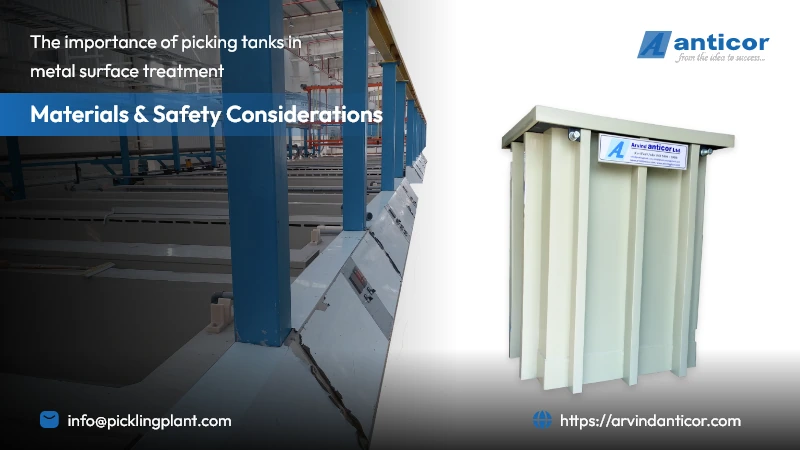

Pickling tanks in metal surface treatment are essential for achieving a clean, oxide-free surface on metal products. These pickling tanks are critical for immersing metal parts in acid solutions to remove rust, oxides, and other impurities, preparing them for further treatment like coating or finishing. In this post, we’ll examine the best materials for pickling tanks and explore key safety measures to ensure smooth and secure operations in your facility.
What Are Pickling Tanks and Why Are They Important?
Pickling tanks are specially designed containers that hold pickling acids used for surface treatment. The pickling process is vital to remove impurities from metal surfaces, ensuring that they are properly prepared for subsequent processes. Whether you’re dealing with steel, iron, or other metals, using a well-constructed pickling tank with the right material is essential to achieve a high-quality finish.
Which Materials Are Best for Pickling Tanks in Metal Surface Treatment?
The materials chosen for pickling tanks must offer high resistance to acidic environments, ensuring both durability and safety. Here are some of the best options available:
- Polypropylene (PP): Polypropylene is highly durable and chemically resistant, making it a top choice for pickling tanks. It can withstand harsh acidic environments over long periods, making it a reliable option for continuous use in metal surface treatment operations.
- PVC (Polyvinyl Chloride): PVC is another excellent material due to its stability and cost-effectiveness. It offers good resistance to acidic substances and can be customized to suit different operation sizes.
- Stainless Steel with Acid-Resistant Lining: In more demanding applications, stainless steel tanks with an acid-resistant coating provide structural integrity while withstanding corrosive environments. This option is particularly suited for heavy-duty metal processing.
- FRP (Fiberglass-Reinforced Plastic): FRP tanks combine strength, corrosion resistance, and longevity. They are lightweight yet durable, making them a good fit for industries handling aggressive chemicals.
How Can You Ensure Safety When Using Pickling Tanks?
Handling pickling acids and managing metal treatment processes comes with various risks. Adopting stringent safety measures is critical for the well-being of workers and the protection of your equipment. Here are some best practices to follow:
- Ensure Proper Ventilation: Pickling acids can release harmful fumes, making proper ventilation a priority. Installing fume extraction systems or ensuring tanks are positioned in well-ventilated areas reduces health hazards to workers.
- Use Personal Protective Equipment (PPE): Workers must wear the appropriate safety gear, such as acid-resistant gloves, goggles, face shields, and full-body suits when necessary. This prevents direct exposure to the acidic solutions used in the tanks.
- Conduct Regular Maintenance and Inspections: Tanks should be regularly inspected for leaks, corrosion, or damage that could lead to spills or exposure to hazardous materials. Prompt repairs or replacements can prevent serious accidents.
- Provide Employee Training: All workers should receive thorough training on handling acids, emergency response procedures, and spill containment protocols. This ensures that they can react quickly and effectively in case of any issues.
Maintenance and Lifespan Optimization of Pickling Tanks
Investing in the right material is just the first step, how you maintain your pickling tanks in metal surface treatment industry greatly impacts their operational lifespan and performance. Even the most chemically resistant tanks can degrade prematurely without proper upkeep.
Here are some best practices to optimize tank life:
- Establish a Preventive Maintenance Schedule: Perform regular checks for weld integrity, corrosion signs, acid residue build-up, and mechanical stress.
- Monitor Acid Concentration and Temperature: Deviations from design specifications can weaken tank material over time.
- Use Tank Lining or Coatings Where Required: In highly aggressive environments, protective linings can extend the life of even robust materials.
- Rotate Tanks During Planned Downtime: If possible, alternate between tanks to reduce continuous strain on a single unit.
- Document All Inspections and Repairs: Maintain logs to identify recurring issues and make informed decisions about refurbishment or replacement.
With proper care, materials like PP, FRP, and PVC can serve reliably for years, reducing total cost of ownership and minimizing production disruptions.
Conclusion
Choosing the right material for your pickling tank and implementing rigorous safety practices are crucial steps in ensuring a smooth and secure metal surface treatment operation. By selecting durable materials like polypropylene, PVC, or FRP, and adhering to strict safety guidelines, you can extend the lifespan of your equipment and protect both your employees and your bottom line.
At Arvind Anticor, we specialize in high-quality pickling tanks and fume extraction systems designed for durability and safety. Contact us today to learn more about our product offerings and how we can help you optimize your operations!
Let’s Connect
Contact Us
We are live 24/7 and reply within 48 hours.
Get in Touch
-
-
-
Address
Survey No.584/1+2 – C,Nr. Akshar Industrial Estate Mahemdabad Highway Road,Vatva Ahmedabad-382445, Gujarat, India.